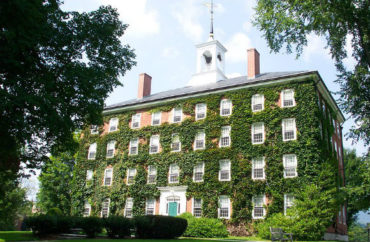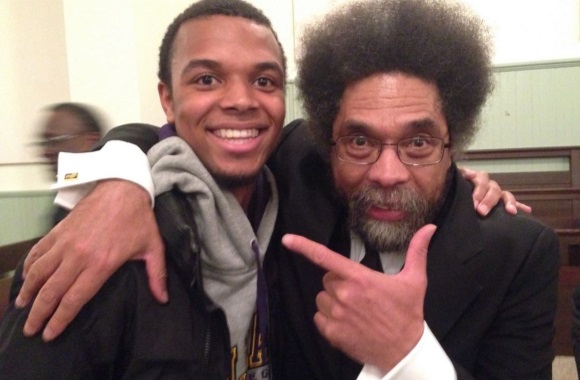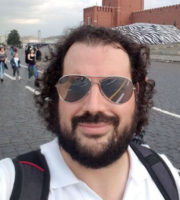
Professor says colleague threatened violence if ‘Chicago Statement’ enacted
Several weeks after announcing she was creating an “ad hoc committee” on making Williams College “both intellectually open and inclusive,” President Maud Mandel shared “the proposed charge” for the committee Wednesday.
It will recommend “speaker invitation guidelines,” considering questions such as how Williams should help students “achieve equal footing” to “expound and challenge diverse ideas,” Mandel wrote to the community.
It will also consider “what types of presentations … best support our educational mission,” given that so many ideas are available online, and what support “if any” Williams should give students and faculty “seeking to host, engage or debate speakers,” she said.
Mandel plans to share the final committee roster with the community on Jan. 30, and its recommendations will be due in May, she said.
MORE: ‘The War on Men’ author disinvited to speak at Williams
The committee’s creation followed a turbulent fall on the elite liberal arts campus. Some faculty started pushing the school to adopt the University of Chicago’s free-speech principles, known as the Chicago Statement, after witnessing student support for speech crackdowns at a September event.
Students crashed a November faculty meeting to discuss the Chicago Statement, claiming that free speech equaled “hate speech,” and one professor threatened to commit violence if Williams adopts such principles, according to a faculty leader of the free-speech movement.
The college also canceled a play by a black playwright after some cast members said it could harm black people. The controversies go back at least two years, when the college disinvited a “paleoconservative” speaker who had been invited by a black student.
Williams College spokesperson Greg Shook did not respond to a College Fix email or text Thursday asking whether the college investigated the professor alleged to have threatened violence. Shook’s email auto-response said he was at a conference Thursday and would not be checking email.
‘This nonsense was met with intense student applause’
Williams Prof. Luana Maroja explained why many professors “have been feeling the walls closing in,” in a narrative she shared with a fellow evolutionary biologist, University of Chicago Prof. Jerry Coyne, whose blog often discusses free-speech issues.
Coyne has said that Williams “is going the way of” Evergreen State College, “becoming a place full of entitled and authoritarian students who don’t for a minute consider that they might be wrong, or even want to hear why they might be wrong.”
 Though her students increasingly question the science of “heritability” and dismiss the phrase “pregnant woman” as offensive, Maroja (left) told Coyne “the situation became critical” for free thought at a Sept. 27 event with the religion scholar Reza Aslan.
Though her students increasingly question the science of “heritability” and dismiss the phrase “pregnant woman” as offensive, Maroja (left) told Coyne “the situation became critical” for free thought at a Sept. 27 event with the religion scholar Reza Aslan.
The subject of the event was “free speech and intolerance,” and Aslan said colleges should not invite speakers whose values “do not align” with their own, according to the Williams Record.
Maroja quoted Aslan as saying “only factual talks” should be allowed on campus, and she paraphrased him as saying “anything that offended him should not be allowed.” She was shocked that “this nonsense was met with intense student applause.”
Brazilian-born professor: ‘I dread seeing censorship in place at my own college’
That’s when six faculty started collaborating on getting the administration to adopt the Chicago Statement.
It declares the “fundamental commitment” of a college to be “the principle that debate or deliberation may not be suppressed” because some or even most community members believe certain ideas are “offensive, unwise, immoral, or wrong-headed.” According to Greg Lukianoff, president of the Foundation for Individual Rights in Education, 51 universities including Princeton, Johns Hopkins and Purdue have adopted their own versions.
Maroja and professors David Gürçay-Morris and Steven Gerrard circulated a petition to voting faculty in October, eventually getting more than 100 signatures “representing a range of disciplines and identities.”
MORE: Here’s the speech Williams students were too offended to hear
They made clear they were not promoting free speech as part of a conservative agenda.
“Being born during a dictatorship in Brazil, I dread seeing censorship in place at my own college,” Maroja wrote in her narrative. “It is truly sad to see freedom of speech appropriated by the Right and by Trump.”
Gürçay-Morris, who teaches theater, told the Record he doesn’t know “how to make art” or teach it “if there isn’t a basic assumption of freedom of expression to do things, to fail things, to do better next time.” Gerrard, a philosopher, said he helped write the petition to “express solidarity with our colleagues in colleges and universities across the country, especially in the South, who face censorship of their views.”
Students told white males to sit down, admit their ‘privilege’
Students and some faculty didn’t see the petition that way, Maroja wrote. A “professor opposed to free speech” shared the petition with students, who crashed what was supposed to be a faculty discussion forum Nov. 15.
About 15 of them waved posters that read “free speech harms,” and many students were “disruptive throughout,” asking “white male professors to sit down and admit their ‘privilege,’” according to Maroja.
They complained about the 2016 invitation of paleoconservative John Derbyshire by the viewpoint diversity club Uncomfortable Learning, whose leader Zachary Wood (below) published a book last year.

MORE: Paleocon invited by black student disinvited to speak at Williams
Maroja was most upset about how some faculty behaved at the meeting. One professor told the students that faculty who had not signed the petition “were with the students,” which created an “us vs them” atmosphere, she wrote.
Another said she “was involved in creating violence in UC Berkeley for Milo Yiannopoulos’s disinvitation and would be ready to do the same at Williams.” Maroja declined to name this professor when asked by The Fix.
Another faculty meeting Nov. 20 was “better and very constructive,” with no students showing up and “dynamic” discussion, according to Maroja. Mandel’s email to campus announcing the ad hoc committee followed a week later.
‘Discursive cover for racism, xenophobia, sexism, homophobia, transphobia’
Williams students launched their own petition against the Chicago Statement the same day as the first faculty meeting, saying the free-speech principles could inflict “potential harm” on the community. A version of it posted by The Feminist Wire, last updated Dec. 5, has 363 signatures.
The petition authors later dubbed themselves the Coalition Against Racist Education Now, writing in a Record op-ed that the petition was drafted by “over 20 students from a wide range of identities and positionalities.”
It claims that the faculty petition “limits the potential for conflicting viewpoints” by not requesting student feedback, “and is thus completely antithetical to a free speech premise.” The term “free speech” has been “co-opted by right-wing and liberal [as opposed to leftist] parties as a discursive cover for racism, xenophobia, sexism, homophobia, transphobia, ableism, and classism.”
The petition suggests that free speech itself is oppressive. “Ultimately, power determines whose speech is given space and taken seriously,” the students wrote. “Giving one person space/time to speak on campus means that another person is not given that space/time.”
The authors alleged that the elite liberal arts school “continually fails to support its most marginalized students, staff and faculty members.” They want a campuswide discussion, for a change, that is “not dominated by conservative and white faculty.”
MORE: Williams cancels play by black playwright, might hurt black people
MORE: Zachary Wood promotes uncomfortable conversations in ‘Uncensored’
IMAGE: Tim4403224246/Wikimedia Commons





Please join the conversation about our stories on Facebook, Twitter, Instagram, Reddit, MeWe, Rumble, Gab, Minds and Gettr.